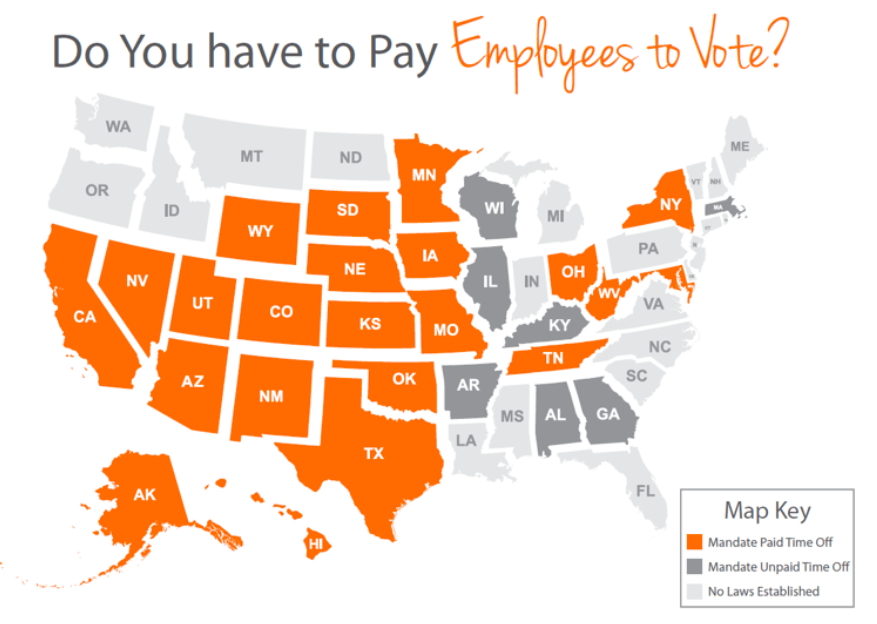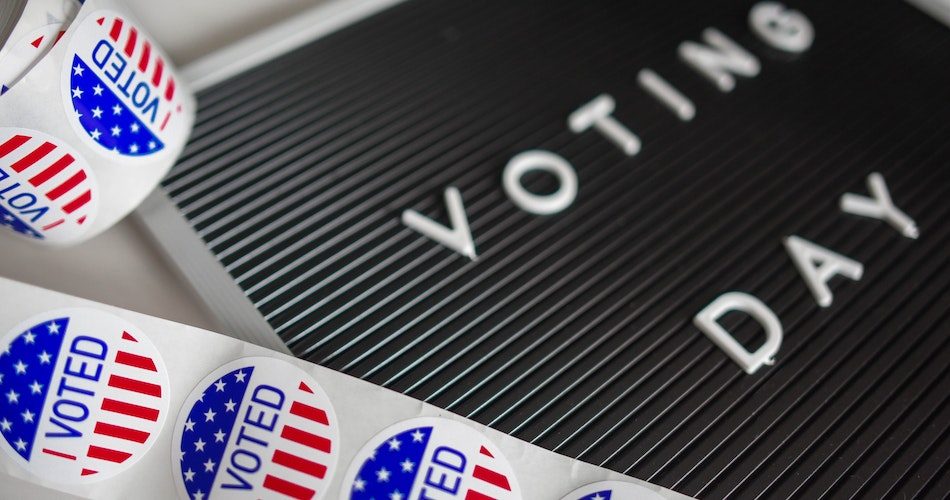While the turnout for election day is in the millions, we still trail behind other developed nations. Comparing the 2020 turnout among voting-age Americans with recent national elections in 49 other countries, the Pew Research Center found the U.S. ranks 31st.
Can the federal government help incentivize voting? Among many other proposals, some voting rights advocates argue that it’s time to make Election Day a federal holiday. While the idea has bipartisan support — a 2018 Pew Research Center survey found 71% of Democrat and 59%, of Republican supporters, it’s not the norm yet.
For now, Americans have voting leave laws to incentivize voting by providing time off from work. Find out about voting leave, federal and state regulations along with frequently asked questions.
What is Voting Leave?
Voting leave is the leave granted to employees to exercise their voting rights. The time off given to vote usually depends upon the distance of the office from the voting booth.
Do Companies Need to Provide Voting Leave?
Companies are not required to provide voting leave or time off to vote to employees if they can manage to vote before or after work. Usually, the voting booths are open from 7:00 am to 8:00 pm. However, if the employee cannot vote before arriving at work or after completing the work, they can request voting leave from their employees.
Federal Laws on Voting Leave
Lawmakers have tried — and failed — in the past to pass legislation that would make paid time off for voting a federal requirement. However, many states have laws to provide time off for voting, sometimes paid but mostly unpaid.
Therefore, the right to take time off for voting depends on the state to which an employee belongs. In addition, the state laws regarding voting leave apply to federal, state, and local elections.
However, if the employees have taken voting leave or time off but do not exercise their right to vote, the employers can take action for the time they spent away from work. Therefore, it is recommended that employees keep proof of casting their votes. This receipt can be produced if management questions them about whether they have made appropriate use of the voting leave or not.
How can Employees use Voting Leave Benefits?
When election day and working hours coincide, the employees must inform the employers in advance, if they need some time off for voting. According to many states, employees might not get any protection from voting leave laws if they don’t convey their intention to vote to the employer in advance.
Informing the employers in advance gives them the added advantage of assigning their tasks to a colleague. Or else, they can at least make the required arrangements so that the voting leave does not affect the team’s productivity. If there is any upcoming deadline, the employee might be asked to work some extra hours if required.
The employees who live in states that don’t have any voting leave laws should investigate the early voting or absentee law of their particular state or verify the voting leave policy of their company. This will help them find a solution, especially if their employer does not give them time off to vote.
But all state laws concerning voting leave benefits apply only if the employees cannot find any way to vote before or after their working hours.

Voting Rights in US States
Alabama
In Alabama, employees are given an hour to vote if they inform their employees in advance. Unfortunately, the time off for voting is usually unpaid. In addition, the law applies only if the employees’ work hours start two hours after the commencement of the polling booth or at least one hour before the polling booth closes.
Alaska
In Alaska, employees get paid time off for voting, but the hours required aren’t mandated by the law. The employees do not have to provide notice in advance to the employer or show voting proof afterward.
Arizona
Up to three hours of paid time off for voting is granted to the employees working in Arizona. But the employer does need to be informed at least one day before Election Day.
Arkansas
In Arkansas, the employer gets to decide the duration of the time off required to vote but it is unpaid time off.
California
In California, employees get paid time off for voting for up to two hours either before the commencement of working hours or after the working hours. But the employer needs to be informed at least two days before the election date.
Employees are eligible for paid time off for the purpose of voting only if they do not have sufficient time outside of working hours to vote. The intent of the law is to provide an opportunity to vote to workers who would not be able to do so because of their jobs.
The California Elections Code section 14001 requires employers to post a notice to employees advising them of provisions for taking paid leave for the purpose of voting in statewide elections.
Colorado
Colorado also provides up to two hours of paid time off for voting to the employees. The employer need not be informed in advance in Colorado.
Georgia
The employees must provide reasonable notice to get time off for voting. Unpaid time off of up to 2 hours is generally granted.
Illinois
In Illinois, to get paid time off for voting for up to two hours, the employees should inform the employer at least one day before the election day.
Iowa
The employees can get paid voting leave of up to three hours in Iowa but have to give advance notice in writing to the employer.
Kansas
In Kansas, employees are eligible for time off to vote for up to two hours. The voting leave will be unpaid, and the employees don’t have to notify the employer in advance.
Kentucky
To get voting leave in Kentucky, the employees must give advance notice to the employer at least one day before the election date. Voting leave of at least 4 hours is applicable and it will be paid time off.
Maryland
In Maryland, employees are eligible for time off to vote for up to two hours. Advance notice is required, and the time off is unpaid.
Massachusetts
In Massachusetts, employees can take up to two hours off to vote during the initial two hours of polling. The time off isn’t paid and employees don’t have to give advance notice to their employer.
Minnesota
The employees of Minnesota get voting leave for the morning session. They don’t have to inform the employer, and the time off is paid.
Missouri
In Missouri, employees get up to three hours off for voting. The employee must inform the employer one day before the election date. If the employees show the vote receipt, they are paid for the time off by the employer.
Nebraska
In Nebraska, employees are allowed to take time off for up to two hours and are paid for these hours. They can get permission from the employer on election day or before that.
Nevada
In Nevada, employees can take time off for voting only if they cannot vote before or after working hours. They need to take permission from the employer on or before the election day. It is paid time off.
New Mexico
In New Mexico, employees can take paid time off to vote for up to two hours. They do need to give their employers any advance notice.
New York
The employees in New York get paid time off as required, provided that they have notified their employers at least two days before the election date.
An employee with four consecutive hours either between the opening of the polls and the beginning of their working shift or between the end of their working shift and the closing of the polls shall be deemed to have sufficient time outside of their working hours to vote. In this case, they are not eligible for paid time off.
North Dakota
North Dakota employees don’t get paid for the time off for voting, but they can take unpaid time off as required.
Ohio
In Ohio, salaried employees get paid time off for voting as per the requirement. Informing the employer in advance is not mandatory.
Oklahoma
Up to two hours of paid time off for voting is allowed in Oklahoma unless the employee lives too far from the polling booth where this duration may be too short. The employer must be informed at least one day before the election day.
South Dakota
South Dakota allows up to two hours of paid time off for voting. Advance intimation to the employer is not mandatory.
Texas
Employees in Texas can take paid time off to vote to exercise their voting rights. But they must inform the employer at least one day before the election.
Utah
Employees who’ve taken permission at least one day before election day are given two hours of paid vacation leave in Utah.
West Virginia
Up to three hours of paid time off for voting is allowed in West Virginia, and the employees must notify the employer through a written request at least three days before the voting day.
Wisconsin
Up to unpaid three hours of time off for voting is allowed in Wisconsin if the employee takes permission a day before the election day.
Wyoming
Up to one hour of paid time off for voting is allowed in Wyoming, and giving prior intimation to the employer is not mandatory.
FAQs on Voting Leave
What States have No Voting Leave Laws?
No voting leave laws are present in:
- Connecticut
- Delaware
- Florida
- Hawaii
- Indiana
- Maine
- Louisiana
- Michigan
- Idaho
- Mississippi
- Montana
- New Jersey
- North Carolina
- South Carolina
- Oregon
- Pennsylvania
- Rhode Island
- The District of Columbia
- Vermont
- Virginia
- Washington
Can Employees Volunteer on Election Day?
Employers mostly provide only a few hours for voting, which is generally enough. However, employees might want to take a vacation or personal leave to help with election day. They must inform the employer in advance if they intend to do so.
The employees cannot just take sick leave and participate as a volunteer at the polls. Even if the employer provides medical leave and the employees want to use it for volunteering on election day, they must convey it to the employer in advance.
Some states, like California, require employers to publish a notice regarding how the employees can benefit from a voting leave or time off for voting before every election day.
How do Employers Handle Voting Leave for Employees who Live in a Different State from where the Company is Registered?
Generally, employment laws apply in the state where the employee works. But in case the voting time off laws are better in the state that the company is registered in, it is always better to take the more generous policy.
For instance, if a business is registered in California and an employee is working out of Washington it makes sense to grant them California paid voting leave in the absence of any mandates in Washington.
What if a Business Doesn’t Follow State Voting Leave Laws?
In many states, a hefty fine is imposed on companies that do not provide voting leave or time off to vote to their employees. However, some states do not have provisions for any such penalty.
For example, in New York, a company’s corporate charter can be removed if they stop any worker from exercising their voting rights. In states like Missouri, Kansas, and Arizona, a fine of $2,500 is imposed on the supervisors if they don’t allow their workers to vote. A staggering $20,000 fine can be slapped on companies in Arizona if they block someone’s voting rights.
Some companies might use their political connections to steer clear of penalties. However, most companies wouldn’t want to stop their employees from taking time off to vote because it will detrimentally impact their public relations. The negative publicity about a company that denies voting rights to its employees spreads like wildfire.
At the end of the day, voting is a key building block of functional democracy, and limiting voting rights helps no one. Businesses must account for things like wait times at polling booths and actively facilitate voting.





